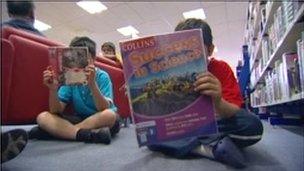Authors help tackle 'can read won't read culture'
- Published

Some 40% of English children say they enjoy reading while 60% can read but won't read for fun
A top children's author is calling for young children in England to be given automatic library membership to tackle the "can read won't read" culture.
Schools minister Nick Gibb invited leading children's authors to advise on ways to make books come alive.
The government is worried that almost two-thirds of English children say they do not enjoy reading.
The writer Michael Rosen told BBC Radio 4 he blamed an over-emphasis on the teaching of phonics in schools.
Mr Rosen said the government's favoured system of synthetic phonics was a good way of breaking down single words but did not necessarily promote reading.
'Phonics is a necessity'
"We've got in place a system in which children can decode words but there's no indication they can read for meaning. If you can read for meaning .... you will want to go on reading because you find it useful."
Both Mr Gibb and Mr Rosen mentioned the meeting in interviews for the series Reading Between the Lines which starts on Tuesday on BBC Radio 4.
A spokesman for the Department of Education confirmed officials were exploring the authors' ideas.
The series investigates English children's poor performance in reading in comparative international studies.
It focuses in particular on the most recent figures from the international reading and literacy study which found that only 40% of English children were keen readers as opposed to 64% of Italians.
'Can read, won't read'
But Mr Gibb claimed some children would slip through the net and not learn to read unless synthetic phonics was taught first and fast during the early years of primary school.
However, he also told the programme's presenter, the author Michael Morpurgo, he was concerned that so many children can read but won't read.
"Phonics is a necessity but not a sufficient condition of being a reader. We are very keen as a government to get children to love reading for pleasure."
He said changes to the national curriculum to give time for children to have stories read to them and to learn poems and passages off by heart were being introduced.
In particular, his policy staff were investigating Mr Rosen's the idea of giving every five-year-old a local library card.
"One of his ideas is for every child. when they start school, they will be issued with a library ticket from the local library and a map of how to get there and then school visits as well," said Mr Gibb.
The minister was also questioned about the wisdom of the government's phonics check on every five to six-year-old in England which is due to take place for the first time next month.
Critics of the policy have said it risks branding around a third of children failures at the very start of their school careers.
Reading Between the Lines, BBC Radio Four, 22 and 29 May, 1600 BST
- Published6 May 2012
- Published8 April 2012
- Published15 March 2012